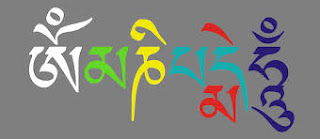Approximate script, with some variations and possible errors: Hello, Hello, and welcome. Have you refreshed your knowledge of Defence Against the Dark Arts recently? If not, perhaps you shoul, as in this episode we are going to talk a tiny bit about magic, demons and dealings with the other side. I’m Alex Wilding and this is the Double Dorje podcast. A year or two ago I paid a visit to an abandoned house 10 minutes away from where I live. It’s a single story building down a slope a few yards from the main road. No neighbours. Overgrown gate, overgrown entrance path, front door fallen in. Pots and pans and empty cans still in the sink, filthy bedclothes still on the bed. I confess I felt too iffy about it to do my chöd practice in there, but took myself to the balcony outside to do the chant, beat the drum, blow the trumpet and so forth. But perhaps my lack of courage was a form of wisdom – I showed some pictures of the place to my teacher who is, amongst other things, an experie...



